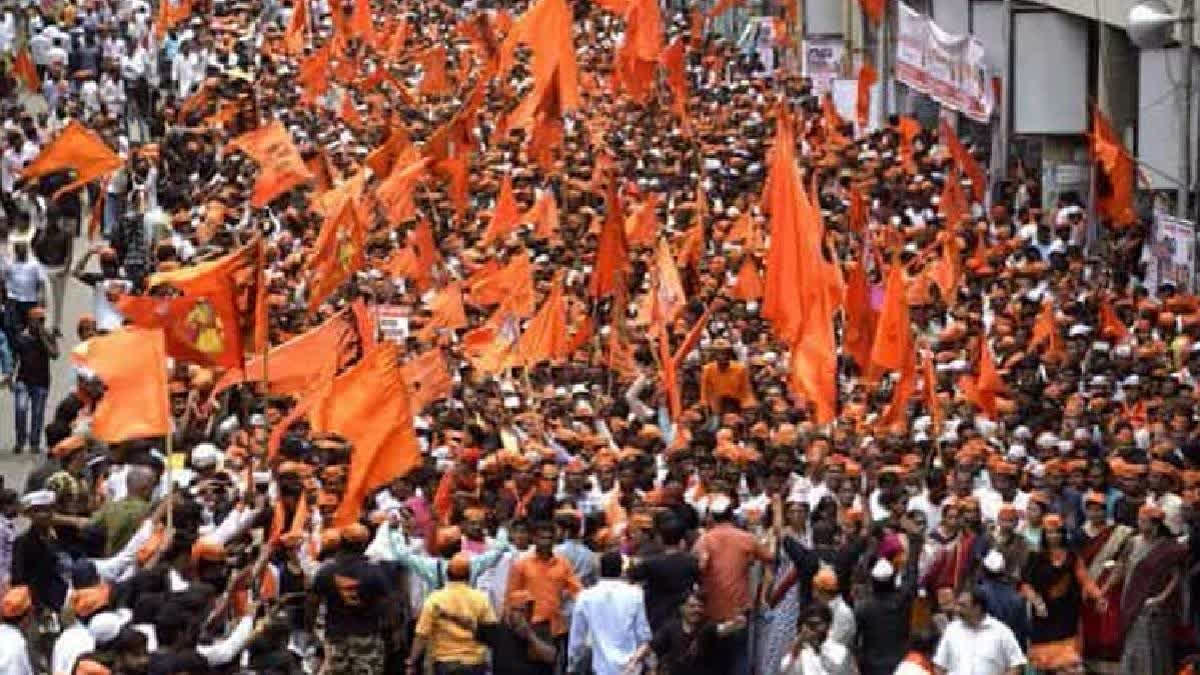Mumbai: With a year to go for Lok Sabha and Assembly elections in Maharashtra, the heat and dust raised over the Maratha reservation threatens to push the state to the brink of political volatility.
Maratha reservation activists resorted to unprecedented violence on Monday setting fire to the bungalows of two sitting Nationalist Congress Party (NCP) MLAs Prakash Solanke (Ajit Pawar faction) and Sandeep Kshirsagar (Pawar faction) in Beed district. Offices of former NCP MLA and minister Jaydutt Kshirsagar’s office were also set on fire.
In Chhatrapati Sambhaji Nagar, protesters threw stones at BJP legislator Prashant Bamb’s office in Gangakhed. Stones were also thrown at the district council and municipal council offices at Majalgaon and another government office in Ashti tehsil in Beed district.
Meanwhile, the Maratha reservation activist Manoj Jarange-Patil who has been on a fast for the past six days turned down the government’s request for talks though the leader said he would discontinue his agitation if the violence continued.
Patil is on a hunger strike since Friday demanding that the government consider all Marathas as Kunbi, a sub-caste of Maratha, to entitle them to reservation benefits for jobs and education available to people from the Other Backward Classes (OBC).
Who are the Marathas?
The Marathas are a group of people of Maharashtra, who call themselves sons of the soil and comprise farmers and landowners among others. They constitute nearly 33 per cent of the state’s population. Marathas are largely Marathi-speaking, but not all language-speaking people are from the Maratha community. This politically significant community in the state comprises nearly one-third of Maharashtra's population. After Maharashtra came into being in 1960, out of its 20 chief ministers, 12, including Eknath Shinde, are from the Maratha community. Beset with the division of land and farming crisis over the years, there has been a decline in prosperity among middle-class and lower-middle-class Marathas. Nonetheless, the community still plays a pivotal role in the rural economy.
The genesis
The demand for Marathas in government jobs and educational institutions is a long-drawn one. Mathadi Labour Union leader Annasaheb Patil launched such a protest for the first time a little over three decades ago in Mumbai. Maratha reservation demand has become an integral part of politics in Maharashtra since 1981. In the past six decades, Maharashtra, which has always been politically dominated by Marathas, failed to find a solution to this vexed problem.
There was a glimmer of hope just before the 2014 assembly elections, when based on Narayan Rane Committee recommendations, the then Prithviraj Chavan-led state government brought an ordinance pronouncing 16 per cent reservation to Marathas in government jobs and education.
The Congress-NCP coalition was dismantled by the BJP-Shiv Sena coalition and a government was formed under Devendra Fadnavis. In August 2016, the Kopardi rape and killing of a 15-year-old girl created a mass protest and anger within Marathas culminated into a well-orchestrated stor under the Maratha Kranti Morcha and Sakal Maratha Samaj across the state.
The protests took a violent turn in 2017-18 and saw the Fadnavis government taking steps to resolve the vexed issue. In November 2018, the government paved the way for the reservation of Marathas under the Socially and Educationally Backward Class Act, a special provision. The reservation gave BJP a political upper hand over the then-rival Congress-NCP.
Cut to 2023, Fadnavis, who holds the important home portfolio, once again faces the heat of his rivals riding the Maratha quota politics. When MVA was in power from 2019 to 2022, the BJP raised reservation issues to consolidate its base among Marathas.
Now, Congress, NCP, Sharad Pawar faction, and Shiv Sena (UBT) have forces to put pressure on CM Eknath Shinde-led government. Fadnavis, who was an upper caste held fort as the CM in 2014-2019, but now Shinde and Deputy CM Ajit Pawar, who belong to the Maratha community, hold sway.
After a hurriedly convened meeting on Monday to find a solution to the Maratha reservation meeting, Chief Minister Eknath Shinde said that the government has formed an advisory board under the leadership of various retired Judges to look into the matter.
CM Shinde said, "We have formed an advisory board on the subject of Maratha reservation under the leadership of retired Justice Bhosle, retired Justice Gaikwad, and retired Justice Shinde. This advisory board will give suggestions to the government in the matter related to keeping Marathas in the Supreme Court as to what can be done regarding Maratha reservation. Along with this, we will also collect empirical data with the help of the Backward Classes Commission in the entire state. So that we can tell the Supreme Court in the curative petition that is pending how backward the Maratha community is."
High Court verdict in 2019
The Bombay High Court in 2019 upheld the constitutional validity of the Maratha quota under the Socially and Educationally Backward Classes (SEBC) Act, 2018. While ruling that the 16 per cent quota granted by the state was not ‘justifiable,’ the HC reduced it to 12 per cent in education and 13 per cent in government jobs, as recommended by the Maharashtra State Backward Class Commission.



